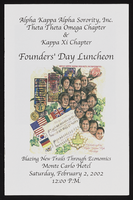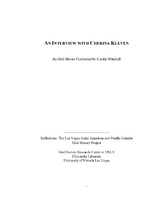Search the Special Collections and Archives Portal
Search Results

James Dean Leavitt oral history interviews: transcript
Date
Archival Collection
Description
Oral history interviews with James Dean Leavitt conducted by Claytee D. White on September 27 and October 4, 2022 for the Boyer Early Las Vegas Oral History Project. In this interview, Leavitt recalls his role in establishing a medical school at the University of Nevada, Las Vegas (UNLV), now known as Kirk Kerkorian School of Medicine. Leavitt was elected to the Board of Regents in 2004 while Jim Rogers was interim Chancellor of the Nevada System of Higher Education (NSHE), and he suggested the creation of an ad hoc committee Health Science Center Committee. In 2009, Leavitt became Chairman of the Board of Regents, Dan Klaich became Chancellor, and in the following year, Dr. Mark Doubrava joined the board. In May 2014, the planning dean was hired, Dr. Barbara Atkinson, and the UNLV School of Medicine was officially established on August 22, 2014.
Text

Alpha Kappa Alpha Sorority, Theta Theta Omega Chapter Founders' Day committee reports
Date
Archival Collection
Description
From the Alpha Kappa Alpha Sorority, Incorporated, Theta Theta Omega Chapter Records (MS-01014) -- Chapter records file.
Text

Cherina Kleven oral history interview: transcript
Date
Archival Collection
Description
Oral history interview with Cherina Kleven conducted by Cecilia Winchell on June 9, 2021 for Reflections: The Las Vegas Asian American and Pacific Islander Oral History Project. Cherina Kleven talks about her family and childhood growing up in Taiwan amongst six siblings. She shares her family's history and how they immigrated to Las Vegas while she was a teen, as well as her employment history and how she met her husband. Cherina talks about racial and gender discrimination and the obstacles she has overcome to be the only working female in her family, the only woman firefighter at her station house, and the first female Asian American Assistant Fire Chief in the United States.
Text

Transcript of interview with Elizabeth "Betty" Krolak by Irene Rostine, September 26, 1995
Date
Archival Collection
Description
In 1962, Elizabeth “Betty” Krolak moved from the Midwest to Las Vegas with her husband and six children. Not only would the drier desert climate benefit her youngest daughter’s health due to asthma, but the family hoped the Las Vegas economy would be beneficial for their future. Prior to her arrival in Las Vegas, Betty worked briefly as a secretary for the New York Central Railroad before becoming a stay-at-home mom and active member of the PTA. Upon their arrival in Las Vegas, Betty’s husband enrolled in a real estate class, but was unable to complete the program. Betty, not wanting to waste the $80 they had spent on the class, decided to attend in his place. This decision led to life changing events for Betty and her family over the next four decades. After taking the real estate class and passing the test, Betty became a licensed Nevada real estate broker in October of 1963. She initially went to work for Pyramid Realty and, in 1964, she opened her own office, Clark County Realty. After her divorce in 1967, Betty was left with “six hungry children” to feed and no child support or health insurance. She recalls how the benefits of being in real estate really became apparent during this period of her life. While real estate required long hours seven days a week, it also afforded a single mother flexibility that other careers would not have offered. Likewise, a woman could make more money in real estate in the 1960s and 1970s than most other careers provided, which was particularly important for Betty who was committed to raising her children without public assistance. Betty’s oral history chronicles the growth of the Las Vegas Board of Realtors which has grown into what today is the Greater Las Vegas Association of Realtors (GLVAR). She recalls how, in the 1960s, meetings took place in bowling allies and the primary role of the GLVAR was to provide networking opportunities and represent the Code of Ethics for realtors. However, the Board was dominated by males, with the role of women members confined to planning social events and arranging for refreshments. In 1968, Betty and several other women realtors set out to change this by initially establishing a local Women’s Council within the Board. In the years following, Betty became the first women to be an Executive Board Member. Today, more than half the members of the Executive Board are women. Betty’s oral history also speaks to many changes within the real estate industry over the past four decades, some positive and some not so positive. She recounts the 1960s to the 1980s, when casino workers’ main source of income came from tips which were often unreported, creating challenges in getting casino workers qualified for home loans because they did not have the ability to document their source of income. Likewise, single women had a hard time qualifying for home loans because they only had one income and, in those days, it rarely was enough to qualify for a mortgage on their own. Also during this period, realtors primarily focused on the resale market because builders wanted to work directly with buyers, but changes in the real estate market eventually led builders to realize the benefits of allowing realtors to sell new houses, too. During her career, Betty also experienced the rise of real estate franchises, beginning with Century 21’s arrival in Nevada, the development of Multiple Listing Service (MLS), changes to educational requirements, approaches to settling disputes, and new approaches to ethics violations. Perhaps the biggest change Betty’s oral history speaks to is the personal approach to selling real estate that has been lost over time. In the early days, brokers sold houses right alongside the sales agents. Today, however, regulations have placed brokers in a position where their primary role is to manage sales people, not sell houses. Also, realtors used to interact with other realtors, title company personnel, and mortgage lenders before technology, such as fax machines and computers, came along. In the early days, documents were transferred in person allowing people in the industry to get to know one another through these personal interactions. Today, everything is done electronically and it is rare to actually know the person on the other end. Selling real estate has lost a lot of its personal touch, according to Betty. In addition to being the mother of six children and running one of the largest real estate offices in the area, Betty also found time to give back to the community through her volunteer work with the Salvation Army. She was instrumental in establishing Southern Nevada’s Angel Tree project, which provides Christmas presents to children who otherwise would not receive them. She was also appointed by Governor Michael O’Callahan to the State of Nevada’s Real Estate Commission, making her the first woman to serve on the Commission. Betty’s career in real estate allowed her to witness and implement many changes that still impact the industry today. When Betty began her career, Las Vegas’ population was just over 45 thousand. By the mid-1990s Green Valley, Spring Valley, North Las Vegas, Summerlin, and Sun City had been developed and the Valley’s population exceeded 1 million people. Betty Krolak’s career merged with the real estate boom as she helped find homes for those who wanted to make Las Vegas their home. She made sure the real estate industry’s growth included women, training mechanisms, and ethics which continue to benefit realtors, home buyers, and home sellers to this day.
Text

Emmy Kasten oral history interview: transcript
Date
Archival Collection
Description
Oral history interview with Emmy Kasten conducted by Kristel Peralta, Ayrton Yamaguchi, and Stefani Evans on March 17, 2021 for Reflections: The Las Vegas Asian American and Pacific Islander Oral History Project. Emmy Kasten discusses her Filipino heritage, her family, and her previous employment working in various industries including acting and broadcasting, marketing, philanthropy, writing, and event production. Emmy shares how she and her husband and children moved to Las Vegas in 2016 after her parents moved to the city a decade earlier, and she discusses her current professional pursuits as a board member of the Miss Asian North America Organization (MANAO) and the Las Vegas Fashion Council. Subjects discussed include: University of California, Irvine (UCI); KTLA Morning News; Red Bull Music Academy; Rock Star Gaming; Filipino foods; Vegas Magazine; and anti-Asian discrimination.
Text

Sara Ortiz oral history interview: transcript
Date
Archival Collection
Description
Oral history interview with Sarah Ortiz conducted by Rodrigo Vazquez on December 20, 2019 for the Latinx Voices of Southern Nevada Oral History Project. In this interview, Ortiz discusses being born and raised in Austin, Texas and spending the majority of her life there before attending the Columbia Publishing Course in Manhattan, New York. Ortiz describes her family's many moves throughout the city of Austin and the changes that have since happened in the city. Ortiz recounts her trajectory in the publishing industry, which led her from Manhattan back to Austin, and eventually to Las Vegas, Nevada. Ortiz is currently the program and festival director for The Believer magazine and the Black Mountain Institute. She writes about what she and her colleagues hope to achieve with the magazine and annual festival, and about the changes that she hopes to see for Las Vegas' publishing and literacy industry.
Text

John McKay interview, March 3, 1980: transcript
Date
Archival Collection
Description
On March 3, 1980, Donna Malloy interviewed John McKay (b. July 7th, 1926 in North Dakota) about his life in Las Vegas, Nevada. McKay begins by speaking about his family history, his career in the electronics and engineering field for aerospace, as well as his experiences in two wars. Moreover, McKay speaks about his hobbies of hunting and fishing and his time as a musician around Las Vegas. McKay also spends time going over how the city of Las Vegas has grown and changed, the increase in crime, and the extreme floods in the 1950s. Lastly, McKay talks about the Nuclear Test Site, how casino gaming chips were used as money around the city, how the city of Las Vegas started and the future of the valley.
Text

Mike Meade interview, February 28, 1977: transcript
Date
Archival Collection
Description
On February 28, 1977, collector Steve Gortz interviewed Mike Meade (b. September 16, 1950 in San Francisco, California) about his life in Nevada. Meade speaks about growing up in Tonopah, Nevada before its decline in population, his move to Elko, Nevada and eventually to the city of Las Vegas. Moreover, he talks about the development of the Strip, the differences between Las Vegas and rural Nevada, as well as the changing environmental landscape. Meade also spends time discussing the controversy surrounding the University of Nevada, Las Vegas (UNLV) dormitory at the time of this interview, the attitude of locals, and his opinion on brothels and prostitution. Lastly, Meade talks about the city’s pollution, the sports and recreation throughout the whole of the state and ends by reading a poem about Nevada from a Bicentennial book.
Text

Barbara Millington interview, March 2, 1980: transcript
Date
Archival Collection
Description
On March 2, 1980, collector David Mowrey interviewed Barbara Millington (born July 3rd, 1937 in Oak Creek, Colorado) at her home in Las Vegas, Nevada. In this interview, Mrs. Millington discusses moving to Las Vegas, Nevada with her family and working various jobs including at Vegas Village and becoming a bookkeeper at a construction firm. She also speaks about the changes she has seen in Las Vegas, such as how casinos were when she first came here compared to how they are now. She ends the interview talking about the need for Las Vegas to find industry outside of gaming. She discusses the need for young people to come back after going away to college to improve the city.
Text

Transcript of interview with Mahamed Youssouf by Barbara Tabach, August 6, 2013 & August 13, 2013
Date
Archival Collection
Description
Ethiopian business owner Mahamed Youssouf became an American citizen in 1986. Born in Harar, Ethiopia, he recalls the hardships he had to endure during the Ethiopia-Somalia conflict. Coming from a family of tailors, he began making clothes with his father at a very early age. Mahamed’s recollections concerning his journey from political refugee to successful businessman demonstrates his resilience and determination to overcome obstacles and achieve his goals. Mahamed moved to Las Vegas, Nevada in 1985, where he rented a storefront in North Las Vegas. The name of his store was Uniform Plus and he focused mainly on making children’s clothes. His efforts proved lucrative as he began buying wholesale in Los Angeles, California, and selling clothes in Las Vegas on the weekends at the outdoor Swap Meet. After a fateful encounter, Mahamed became business partners with Eugene Hoffman, owner of Village East Cleaners. Mahamed firmly believes that communication is the key to socio-economic success. He views education as an investment and states that, “to have dialogue means better relationships.” When the Ethiopian government was overthrown, Mahamed returned home to Africa for a visit. He met his wife while there, got married, and started a family. Mahamed returned to America and bought a family home in Las Vegas. He dedicated his time to teaching his American born children more about Ethiopian culture and taught himself more about American culture— including the African-American experience in Las Vegas, racism, the Moulin Rouge, and the Westside.
Text
